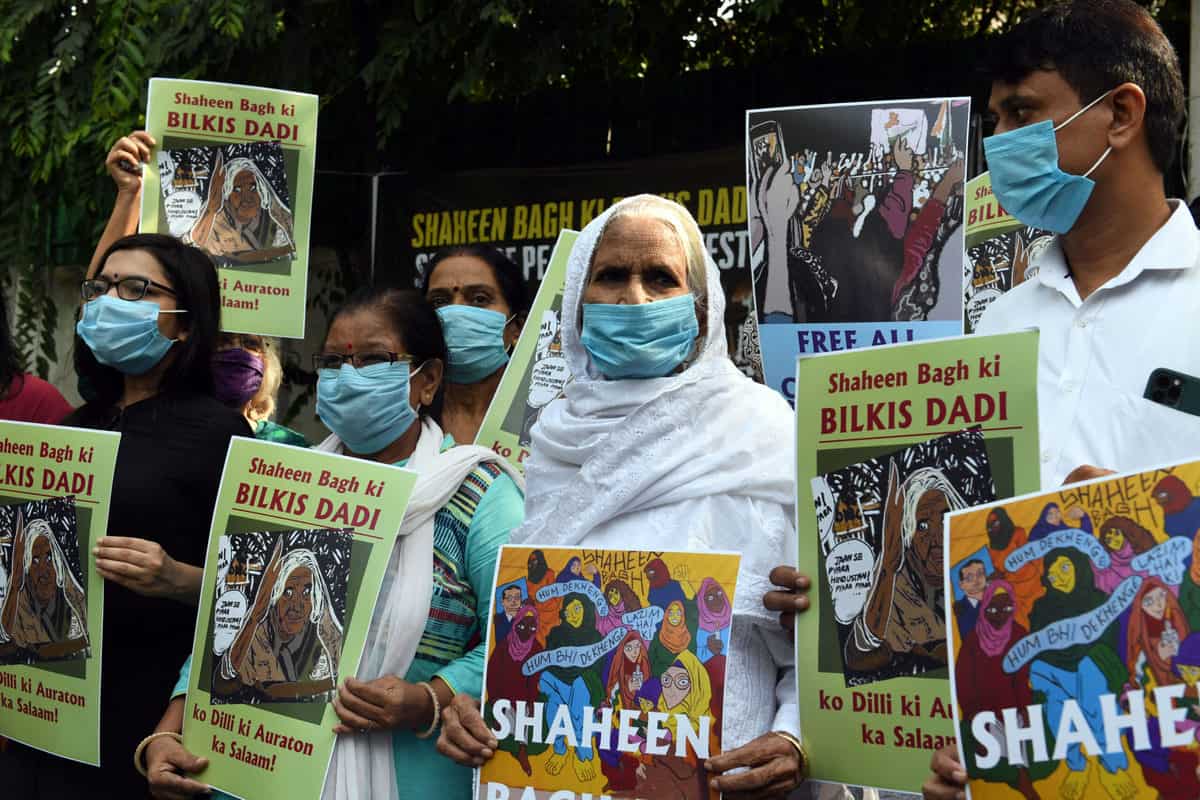
Hyderabad: The Shaheen Bagh protest has become a powerful symbol of resistance in modern India, transforming the narrative around Muslim women and their role in activism. The peaceful sit-in, which lasted from December 2019 to March 2020, saw women—mostly Muslim, including grandmothers like Bilquis— take to the streets in protest against the Citizenship Amendment Act (CAA) and the National Population Register (NPR). What made this movement unique was its leadership: women who had often been stereotyped as passive or marginalized, stepping forward to challenge an exclusionary law.
Bilquis, one of the elderly women who became the face of the protest, even made it to Time magazine’s 2020 list of the 100 most influential people. She, along with other women from Shaheen Bagh, demolished the myths about Muslim women being submissive or confined to the domestic sphere. Their presence on the protest frontlines was not just a rejection of unjust laws but also a statement of empowerment.
This movement also ignited a wave of protest poetry, often referred to as ‘inqilabi shayeri’. Poets, including women writers, inspired by the spirit of the protest, began crafting powerful verses that captured the emotions, struggles, and hopes of the movement. This poetry provided the fuel to sustain the energy and resolve of the protestors, articulating a collective voice against oppression. The verses became anthems, blending resistance with creativity and lending the protest a cultural dimension.
Through Shaheen Bagh, women became not only participants but also creators of a new language of dissent, proving that resistance can be both peaceful and deeply transformative. This protest, led by women, will be remembered as a landmark moment in India’s history of civil resistance.
Rafia Nausheen, a writer and activist from Hyderabad, has captured the spirit of the Shaheen Bagh movement in her recently released book titled ‘Shaheen Bagh ke Naghme’. The book is a compilation of verses and protest poetry composed during the resistance against the Citizenship Amendment Act (CAA) and the National Population Register (NPR), which galvanized people across the nation.
Flipping through its pages one can feel the pulse of the protest—its pain, anguish, and resilience. The verses reflect the lived experiences of those who took part in the 101-day sit-in, especially the women whose voices were amplified through poetry. Each poem serves as a reminder of the emotional and cultural resistance that defined Shaheen Bagh, giving readers a window into the hearts of those who fought peacefully against the draconian law.
The book is not just a collection of poetry; it is a collector’s item that memorializes a moment in history when ordinary citizens, particularly women, became the vanguards of justice. Nausheen’s work ensures that the songs of Shaheen Bagh live on, continuing to inspire future generations.
This couplet of Rafia Nausheen encapsulates the strength of protest, reflecting the core spirit of the anti-CAA movement.
Suna hai hum ne ke hai ehtejaj main taqat
Agar ye sacch hai chalo ehtejaj karte hain
An activist from Hyderabad, Nausheen was among the first to raise her voice against the controversial Act, participating in protests organized by Anjuman-e-Taraqqi Pasand Musannafeen and the Progressive Organization of Women. Her dedication to the cause even led to her arrest, symbolizing her commitment to fighting injustice.
According to Nausheen, what truly awakened the masses during this time was the revolutionary Urdu poetry that emerged. These verses played a pivotal role in stirring the conscience of the people, awakening a ‘sleeping community’ and inspiring others to join the fight against the CAA. The poems penned by writers from all over the country became a reflection and commentary on the contentious Act, channeling the pain, resistance, and hope of the protestors.
Varan Grover’s powerful poem ‘Hum Kagaz Nahin Dikhaenge’ became a rallying cry during the anti-CAA protests, setting the tone for the resistance. Its defiance against showing identity papers resonated deeply with protestors, symbolizing a refusal to comply with unjust laws. Alongside it, legendary poet Rahat Indori’s famous line ‘Kisi ke baap ka Hindustan thodi hai’ electrified the crowd, emphasizing the idea that the country belongs to all its citizens, not to a select few. These lines, echoing through protests, united people in their fight for equality and justice, adding fuel to the fire of the movement.
One such example is Abdul Kareem Shad’s powerful nazm, which captures the transformative role of Shaheen Bagh in the movement:
Zulm par ek war hai Shaheen Bagh,
Aman ka izhar hai Shaheen Bagh,
Jis ko sun kar kamp utah taqat-o-taj,
Aisi ek lalkar hai Shaheen Bagh,
Pehle peeche chal rahi thi auratein,
Aaj to sardar hai Shaheen Bagh
Similarly, poetess Nabia Khan’s verses highlight the leading role played by Muslim women during the protests, offering a beautiful portrayal of their courage:
Kabhi Shaheen Bagh ki shaam ban ke,
Kabhi Jamia ki dastan ban ke,
Kabhi Aligarh ki awam ban ke,
Kabhi Faiz ki nazmon ka unwan ban ke
Lene tumhare zulm-o-sitam ka har ek hisab
Ayega inqilab pehen ke bindi, burqa, hijab
Nausheen’s book, Shaheen Bagh ke Naghme, is a chronicle of both the movement and the poetry that defined it—a vital source of inspiration for future struggles against injustice.
